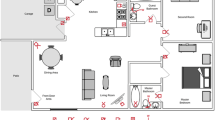Abstract
Monitoring and timely intervention are extremely important in the continuous management of health and wellness among all segments of the population, but particularly among those with mild dementia. In relation to this, we prescribe three design principles for the construction of services and applications. These are ambient intelligence, service continuity, and micro-context. In this paper, we provide three exemplars from our research and development activities that illustrate the use of these design principles in the construction of services and applications. All the applications are drawn from the field of care for mild dementia patients in their living quarters.












Similar content being viewed by others
References
Continua Alliance: www.continuaalliance.org/ (accessed 6th May 2010)
ICOST – International Conference on Smart Homes and Health Telematics – http://handicom.it-sudparis.eu/icost2009/ (accessed 6th May 2010)
Functional Assessment Staging of Alzheimer’s Disease (from http://geriatrics.uthscsa.edu/tools/FAST.pdf) (accessed 6th May 2010) ©1984 by Barry Reisberg, M.D. All rights reserved. Reisberg B (1988) Functional Assessment Staging (FAST). Psychopharmacol Bull 24:653–659
Biswas J, Jayachandran M, Shue L, Xiao W, Yap P (2007) An extensible system for sleep activity pattern monitoring. Proceedings of the International Conference on Intelligent Sensors, Sensor Networks and Information, (ISSNIP) 2007, pages 561–565, 3–6 Dec. 2007, Melbourne, Australia
Wai AAP, Fook VFS, Jayachandran M, Biswas J, Nugent CD, Mulvenna MD, Lee J-E, Yap P (2008) Smart wireless continence management system for persons with dementia. J Telemed e-Health, October 2008
Biswas TA, J Chen-Khong Tham Yap (2008) Eating activity primitives detection - a step towards ADL recognition, P.in HealthCom 2008. In the 10th International Conference on e-health Networking, Applications and Services, Singapore, 7th-9th July 2008, pp 35–41
Hongbo Ni, Xingshe Zhou, Daqing Zhang, Kejian Miao and Yaqi Fu (2009) Towards a task supporting system with CBR approach in smart home. Proceedings of International Conference on Smart Homes and Health Telematics, ICOST 2009, Paris, France, 1–3 July 2009
Feki MA, Biswas J, Tolstikov A (2009) Model and algorithmic framework for detection and correction of cognitive errors. J Healthcare Eng 17(3):203–219
Andrei Tolstikov, Chen-Khong Tham and Jit Biswas (2005) Data loss regulation to ensure information quality in sensor networks. Proceedings of the International Conference on Intelligent Sensors, Sensor Networks and Information, (ISSNIP) 2005, Melbourne, Australia, 5–8 Dec. 2005, pp 133–138
Jit Biswas, Felix Naumann and Qiang Qiu, Assessing the completeness of sensor data. Proceedings of the 11th International Conference on Database Systems for Advanced Applications, DASFAA 2006, LNCS 3882, Springer, pp 717–732
Jit Biswas, Chen-Khong Tham and Andrei Tolstikov (2008) Method for automatic configuration of sensor set selection for information quality guarantees. I2R Technology Disclosure, 2nd October 2008, Institute for Infocomm Research, Singapore 138632
Hill J, Culler D (2002) Mica: a wireless platform for deeply embedded networks. IEEE Micro 22(6):12–24
Jit Biswas, Santos Kumar Das, Qiang Qui, Vijaya Saradhi Chava and Viet Thang Pham (2005) Quality aware elderly people monitoring using ultrasonic sensors. In Proceedings of the International Conference on Smart Homes and Health Telematics, ICOST 2005, Sherbrooke, Canada, 4–6 July 2005, pp 107–115
Jit Biswas, Daqing Zhang, Guopei Qiao, Victor Foo, Qiang Qui and Philip Yap (2006) A system for activity monitoring and patient tracking in a smart hospital. In Proceedings of the International Conference on Smart Homes and Health Telematics, ICOST 2006, Belfast, Northern Ireland, 26–28 June 2006, pp 196–203
Gregory Abowd, Aaron Bobick, Irfan Essa, Elizabeth Mynatt and Wendy Rogers (2002) The aware home: developing technologies for successful aging. In Proceedings of AAAI Workshop and Automation as a Care Giver, Workshop held in conjunction with American Association of Artificial Intelligence (AAAI) Conference 2002, Alberta, Canada, July 2002., pp 1–7
Backman A, Bodin K, Bucht G, Janlert L-E, Maxhall M, Pederson T, Sjölie D, Sondell B and Surie D (2006) easyADL – wearable support system for independent life despite dementia. In Workshop on Designing Technology for People with Cognitive Impairments CHI2006 April 22–23, 2006, Montreal, Canada
Hoey Jesse (2006) Tracking using flocks of features with application to assisted handwashing. In Proceedings of the British Machine Vision Conference, Edinburgh, UK, 4-7 Sept. 2006, http://www.computing.dundee.ac.uk/staff/jessehoey/papers/hoeybmvc06.pdf, (accessed 6th May 2010)
Allin SJ, Bharucha A, Zimmerman J, Wilson D, Roberson MJ, Stevens S, Wactlar H, Atkeson CG (2003) Toward the automatic assessment of behavioral disturbances of dementia. Fifth International Conference on Ubiquitous Computing (UbiComp'03), 2nd International Workshop on Ubiquitous Computing for Pervasive Healthcare Applications, Seattle, WA, Oct 12–15, 2003
Demiris G, Skubic M, Parker Oliver DR, Rantz MJ, Aud MA, Lee J, Burks K, Keller J, Green N (2006) End-user involvement in interface design in smart home applications: the nursing perspective. Presented at the International Conference on Aging, Disability and Independence (ICADI) 2006, St. Petersburg, Florida, pp 21–23 February 2006
Donald J (2005) Fine-grained activity recognition by aggregating abstract object usage. Patterson and Dieter Fox and Henry Kautz and Matthai Philipose, ISWC '05: Proceedings of the Ninth IEEE International Symposium on Wearable Computers, Osaka, Japan, 18-21 October 2005, pp 44–51
Siddharth Dalal, Majd Alwan, Reza Seifrafi, Steve Kell, Donald Brown (2005) A rule-based approach to the analysis of Elders' activity data: detection of health and possible emergency conditions. AAAI Fall 2005 Symposium (EMBC), Shanghai, China, 1–4 Sep. 2005, http://marc.med.virginia.edu/pdfs/library/FS205DalalS.pdf (accessed 6th May 2010)
Andrei Tolstikov, Chen-Khong Tham, Wendong Xiao, Jit Biswas (2007) Information quality mapping in resource-constrained multi-modal data fusion system over wireless sensor network with losses. In Proceedings of the International Conference on Information, Communications and Signal Processing, Singapore, pp 1–13 Dec. 2007
INTEL Labs, Seattle, Technology for Long Term Care http://seattle.intel-research.net/research.php (accessed 6th May 2010)
Oregon Health and Science University’s Oregon Center for Ageing and Technology, http://www.orcatech.org (accessed 6th May 2010)
Technology Research for Independent Living TRIL http://www.trilcentre.org (accessed 6th May 2010)
European Center for Connected Health, http://www.eu-cch.org/ (accessed 6th May 2010)
Author information
Authors and Affiliations
Corresponding author
Rights and permissions
About this article
Cite this article
Biswas, J., Tolstikov, A., Jayachandran, M. et al. Health and wellness monitoring through wearable and ambient sensors: exemplars from home-based care of elderly with mild dementia. Ann. Telecommun. 65, 505–521 (2010). https://doi.org/10.1007/s12243-010-0176-0
Received:
Accepted:
Published:
Issue Date:
DOI: https://doi.org/10.1007/s12243-010-0176-0




